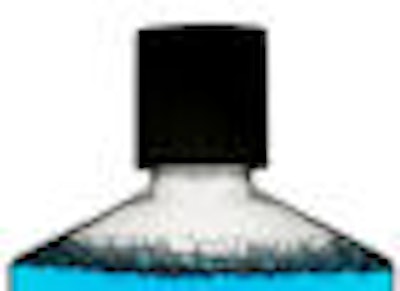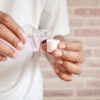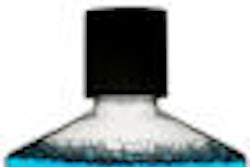
Conflicting reports about the role of alcohol-containing mouthwashes in the development of oral cancer prompted British researchers to delve into two recent epidemiological studies on this topic to determine if, in fact, there is a clear answer (British Dental Journal, Vol. 207, E19; published online November 28, 2009).
However, while their conclusions provide some potential guidance for the dental team, they fall short of being definitive.
Professor Robin Seymour and Clinical Lecturer Carlos Werner of the School of Dental Sciences at Newcastle University set out to evaluate two recent epidemiological studies on this topic using an evidence-based approach (Australian Dental Journal, December 2008, Vol. 53, pp. 302-305; and Oral Oncology, October 2008, Vol. 45, pp. 198-200).
The conclusions from these two studies are conflicting, they noted. The ADJ review states that "there is no sufficient evidence to accept the proposition that alcohol containing mouthwashes contribute to the increase of the development of oral cancer," while the Oral Oncology article concludes that "critical review of the published data revealed that a link between mouthwash use, specifically alcohol containing mouthwash and oral cancers, is not supported by epidemiological evidence."
Such contrary findings prompted Seymour and Werner to look critically at both reviews, interpret the evidence, and "hopefully provide readers with an opinion on the safety or otherwise of alcohol containing mouthwashes … [and] empower all members of the dental team with the best clinical advice on the use of mouthwashes."
Facilitating vs. risk factor
Alcohol (primarily ethanol) is used in mouthwashes mainly as a solvent for other active ingredients. It also acts as a preservative and has antiseptic properties.
But studies have also shown that high concentrations of alcohol in mouthwashes may have detrimental oral effects, such as epithelial detachment, keratosis, mucosal ulceration, gingivitis, petechiae, and oral pain (Medicina Oral, Patologia Oral, Cirugia Bucal 2004, Vol. 9, pp. 120-123; Journal of Periodontal Research 1995, Vol. 30, pp. 192-197).
Additional research has shown that alcohol-containing mouthwashes can have other adverse effects on oral structures and functions, including burning mouth, drying of the oral mucosa, and softening of composite filling materials, according to Seymour and Werner. In addition, the prime metabolite of alcohol – acetaldehyde – which is mutagenic and has been shown to be carcinogenic in animal studies, they noted.
"While the bulk of the metabolism of alcohol is carried out in the liver, there is evidence that alcohol metabolism could occur in the oral cavity and that various bacteria in plaque can metabolize alcohol to acetaldehyde," they wrote.
Even so, while the ADJ review initially suggests an increased risk of oral cancer from using alcohol-based mouthwashes, this suggestion is based upon case-control studies that examined the smoking-alcohol association in general, with no stratification for alcohol-containing mouthwash use, according to Seymour and Werner.
"The laboratory studies quoted in this review, at best, explore the link between alcohol and oral cancer as a facilitating factor rather than a causal or risk factor," they wrote. "A more balanced view on existing association between alcohol-containing mouthwashes from case control studies would have increased the credibility of the conclusion from this paper."
Similarly, while the Oral Oncology review concluded that alcohol-containing mouthwash use was not associated with an increased risk of oral squamous cell cancer, using data from the only two papers that specifically looked at alcohol-containing mouthwashes as a risk for oral cancer, "the conclusion … does not appear to provide a balanced view of the analysis of the data," Seymour and Werner wrote. "The opposing arguments were not considered [and] results from previous case control studies were not mentioned."
In addition, epidemiological evidence from case-control studies showing no association between alcohol-containing mouthwashes and oral cancer were "scant," they noted.
A recommendation
While the ADJ and Oral Oncology reviews have limitations, and there is much evidence to support the use of mouthwashes to reduce bacterial plaque and gingivitis and aid mechanical methods of plaque removal, "studies comparing alcohol-based and alcohol-free mouthwashes have, for the most part, shown that the alcohol content adds little in the way of efficacy to the product," Seymour and Werner contend.
Their conclusion? "As the benefit of alcohol in a mouthwash is negligible and it may carry a risk of oral cancer which is difficult to quantify, is there any value in members of the dental team prescribing/recommending alcohol containing mouthwashes to their patients?"
Given the growing number of alternative, alcohol-free mouthwashes now available on the market and a growing body of research supporting their efficacy, it is not an unfair question.
Even so, Sol Silverman, D.D.S., a professor of oral medicine at the University of California, San Francisco School of Dentistry and an oral cancer expert, emphasizes that a direct link between the use of alcohol-containing mouthwash and increased risk of oral cancer has not been clearly established by the research to date.
"There is no high-level, systematic, evidence-based data to support an association between alcohol-containing mouth rinses and oral cancer," he told DrBicuspid.com.



















